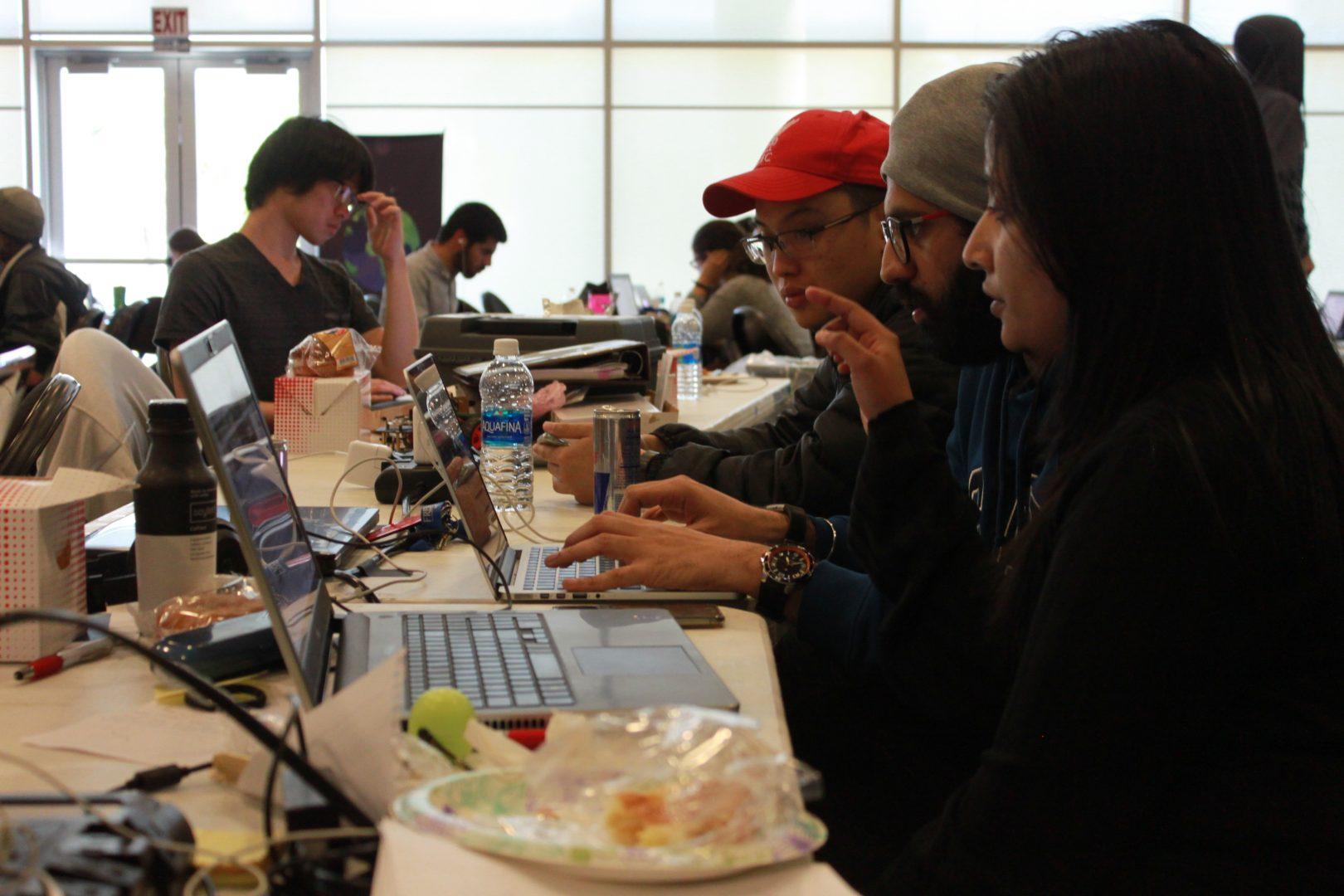HackFresno took over the North Gym Friday as over 100 students came to make a simple idea into a benefit for the community.
Students arrived last Friday and were split into five-person teams, then assigned to create a prototype based on a specific category.
The categories included: education, environment and agriculture, health and wellness and social good.
The students had 24 hours to work on the idea as a team and then pitch their prototype it to judges.
The lead organizer of the event, computer engineering student Rahul Nunna said, “The word ‘hack’ means collaborating on a task, usually with code, to solve a specific problem.”
Once the event commenced, Nunna said the mood initially was “shy.” Once a top 40 music playlist played throughout the gym, the hackers became much more comfortable.
Nunna said around 4 to 5 a.m., students were losing their energy and some went home to get some sleep. Approximately 40 students stayed and continued on throughout the morning.
Giveaways and activities were used as incentives to stay awake and build team morale. Coding problems were displayed and those who got the answer first won prizes from the event sponsors.
Around noon, Nunna said, the energy picked back up and students worked throughout the evening until 6 p.m., when the projects were due to the judges.
Nunna said space, power, Wi-Fi and food are the biggest components considered when creating a hackathon event.
“You want to give them a place to work, give them all the power and internet that they need to get connected, then get fed,” Nunna said.
The atmosphere was very friendly, and everyone was helped each other due to it being a smaller event, Nunna said. She added that three goals were put into place for the event. The first goal is for students to get exposure to the real expectations of the technology industry.
The second goal is for university students to form a relationship with Silicon Valley technology companies to benefit their future careers.
“We want to start that conversation. In the past, Fresno State hasn’t been a school that had a very close relationship with that industry,” Nunna said.
Lastly, Nunna said a goal is to get students to begin thinking about how they can use their technology knowledge to benefit the community.
Victoria Fall, a double-major in computer science and business administration with an option in information systems, said her team Prestige Worldwide chose the theme social good.
The app they are creating is called “OmmNomNow,” and Fall said the goal of it is to help local food truck businesses and the community by building an app to find where nearby food trucks are.
Fall is the back-end developer of the team meaning she will create codes to communicate to the server to display information.
Jonathan Castro, a graphic design major with an emphasis in multimedia, said inspiration for the event came from seeing “mom and pop” food trucks that he said need to be highlighted in the community.
Castro is the front-end developer who designed the graphics.
“I make it look pretty,” he said. “[I] pretty much just style it with graphic design and do coding here and there.”
After almost 24 hours of working on the prototype, Castro said he finds his motivation in knowing he is helping to create something that can be of use to everyone in the community.
“That’s what keeps me going, that this could be a possible app that you could use,” Castro said.
By the end of the night, the team won first place in the social good category, winning $500 to share.
“When I first saw our name on the projector and called out — the hours spent staying up and working felt worth it,” Castro said.
The group’s project will continue to be proposed.
“Our group is savvy in coding and development — we would love to redo the design better, this was just something we could push out real quick in the 24 hours we had,” he said.
Nunna said that he saw a change in students’ mentality as opposed to passed hackathon events he has attended.
“Instead of thinking, ‘How can I make something cool?’ it was, ‘How can I make something that actually impacts somebody else?’,” Nunna said.
The event was coordinated by computer engineering and computer science students as well as faculty and staff from the Lyles College of Engineering and College of Science and Mathematics.
Teams worked on projects such as automatic pill dispensers and a system to connect students and tutors. All student coordinators are also members of the university’s Institute of Electrical and Electronic Engineers. The hackathon provided workshops by Adobe, Apple and 59 Days of Code.
One of the event sponsors, Major League Hacking allowed students to borrow gaming consoles, laptops, technology resources, tablets and technology attachments to help students with their projects.
MLH representative and hacking coach Yacoub Oulad Daoud said it is important to provide these resources to students because it helps them cultivate their ideas and expand their knowledge beyond their means.
By 6:30 p.m. on Saturday, students finished their prototypes and presented their hacks to the judges.
Top four awards were given out for each category, and first, second, and third place prizes were given for overall winners.
Adobe and OneSense both gave out awards to those who utilized products related to their brands.
Students were judged based on their ideas, technical quality and pitch of their prototype.
The four judges were Pratima Sakinala from Shift3 Technologies, Orlando Leon from the university’s Technology Services, Dant Morris from LinkUs and Ram Nunna, dean of the Lyles College of Engineering
Nunna said he would love for HackFresno to become an annual event at Fresno State.
“We want to continue this, we want this to be a first step to getting our students more tech ready and more involved in this area,” he said.




